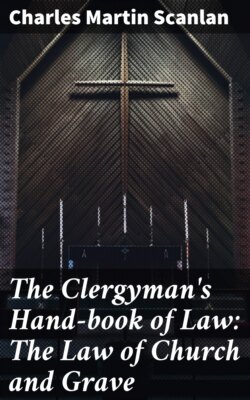Читать книгу The Clergyman's Hand-book of Law: The Law of Church and Grave - Charles Martin Scanlan - Страница 4
На сайте Литреса книга снята с продажи.
Preface
ОглавлениеTable of Contents
The three learned professions, medicine, law, and theology, overlap; and a man who does not know something of the other two can not be prominent in his own. Laws relating to Church matters are scattered through such a vast array of law books that it would be a burden for a clergyman to purchase them, and without special training he would not know where to look for the law. Therefore a law compendium covering those subjects relating to Church matters must be of great value to a clergyman.
There is another view of this subject. When she was mistress of the world the laws of the Roman Empire were for the Roman citizens, particularly the patricians; the canon law was the law of the Christian people of conquered countries and the Christian plebeians of Rome. In the United States we have the same common law for the President and the hod-carrier, for the multimillionaire [pg vi] and the penniless orphan, for the clergy and the laity. Consequently, in this practical age a knowledge of the law of the country with which the clergy come constantly in contact is expedient, if not necessary.
The poet says:
“What constitutes a state?...
Men, who their duties know,
But know their rights, and knowing, dare maintain.”
To insure harmony and good order, every Church should obey the laws of the country; but if any law should impose upon the rights of the Church in any way, the ruling authorities, the cardinal and bishops, if the wrong is national, should unite in a petition to the United States Congress, clearly stating the grievance and asking for its redress.1 If the grievance should be within a State, the bishop or bishops of the State should present the matter to the Legislature of the State. If the President or the Governor has authority to remedy the matter, go direct to him. Such was the practice of the wisest of the Popes.2 The author never knew of an instance [pg vii] in which a clergyman having a real grievance failed in obtaining a full and fair hearing from the powers that be, from the President downward. This method seems to be more in harmony with the relations of Church and State in a free government, and more intelligent than to have a convention of working men, who have little time to make a study of Church matters, pass resolutions, the passing of which generally ends the action of a convention.
In the chapters that follow, the author has refrained from giving a great multitude of authorities, but has endeavored to give such as are sufficient to sustain the text. For example, under the first section, and many others, a list of citations covering several pages might be given. That would add to the expense of the volume and would not be within its compass. The book will better fulfil its purpose by clear, brief statements of the rules of law, and if a reader desires to investigate further, the citations given will guide his way.
Charles M. Scanlan.
Milwaukee, January 23, 1909.
[pg 013]
